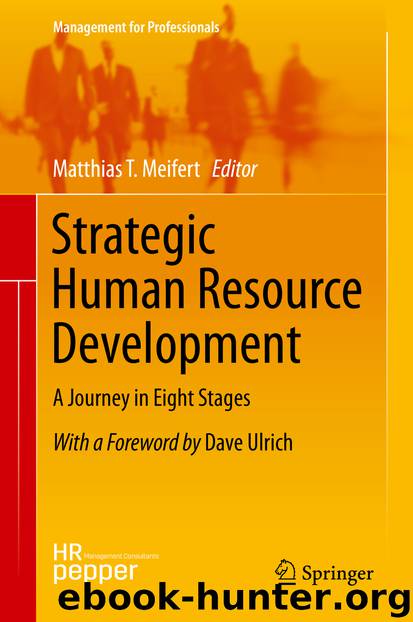Strategic Human Resource Development by Matthias T. Meifert

Author:Matthias T. Meifert
Language: eng
Format: epub
Publisher: Springer Berlin Heidelberg, Berlin, Heidelberg
1 What Is Qualification Management?
The term “qualification management” arose in the 1990s to refer to a management system dedicated to the planning, organisation, administration, and resource-effective delivery of occupational and private adult education. The debate about sustainable management concepts for training and education goes back to the 1970s (Meisel, 1994, pp. 384–387). It moved away from the original interest in the planning and supervision of courses (Meisel, 1994, pp. 384–387) to cover company, target group, and industry-specific perspectives due to intensifying debate among qualification management professionals. At its heart, qualification management refers holistically to the competences and abilities of personnel: “Qualification management makes sure that employees are given the knowledge and abilities that they need to do their jobs” (Herter, 1998, p. 28).
The pace of technological and societal change has been exerting more and more pressure on companies to adapt and on their employees to get trained and qualified (Arnold & Krämer-Stürzl, 1999, pp. 28–32). The concepts of lifelong learning or the learning organisation – not to mention the new idea of the “learning region” – represent the new prominence of qualification management in modern knowledge economies (Freitag & Schöne, 2004; Matthiesen & Reutter, 2003; Witthaus & Wittwer, 1997).
We can use a systemic understanding of qualification management, which goes beyond categories of organisational departments and bases its tasks and responsibilities on the general goals of the organisation and/or its stakeholders (cf. Part II and Bäumer, 1999, p. 21). Qualification management is situated within the system of the company and draws its essential mission from that system. It analyses the internal and external circumstances and knows the organisational, and individual, education and development needs. It produces education services to match those needs, checks their effectiveness, and makes their benefits and value visible for the company and its people. It applies state-of-the-art, scientific adult education standards when planning, conducting, or controlling these services. Seen in general terms, qualification management has a flexible innovative role to play: “Education needs to look ahead to the future and shift its focus to the key qualifications. … Learning must become a situational experience, and qualification management turns into a situational leadership activity” (Decker, 1995, p. 30f).
Download
This site does not store any files on its server. We only index and link to content provided by other sites. Please contact the content providers to delete copyright contents if any and email us, we'll remove relevant links or contents immediately.
Bullshit Jobs by David Graeber(4167)
Radical Candor by Kim Scott(2706)
I Am Right, You Are Wrong by Edward De Bono(2434)
23:27 by H. L. Roberts(2240)
Nomadland by Jessica Bruder(2053)
Average Is Over by Tyler Cowen(1833)
The Conflict Resolution Phrase Book by Barbara Mitchell & Cornelia Gamlem(1760)
Out of Our Minds: Learning to Be Creative by Ken Robinson(1727)
High-Impact Interview Questions by Victoria A. Hoevemeyer(1678)
The Ideal Team Player by Patrick M. Lencioni(1631)
An Everyone Culture: Becoming a Deliberately Developmental Organization by Robert Kegan & Lisa Laskow Lahey(1629)
Who Moved My Cheese?: An Amazing Way to Deal With Change in Your Work and in Your Life by Johnson Spencer(1627)
The Asshole Survival Guide by Robert I. Sutton(1595)
Automatic Society by Bernard Stiegler(1544)
Unleashed by Anne Morriss & Frances Frei(1532)
Who by Street Randy & Smart Geoff(1492)
42 Rules of Employee Engagement by Susan Stamm(1461)
96 Great Interview Questions to Ask Before You Hire by Paul Falcone(1441)
Fish! by Stephen C. Lundin(1392)
